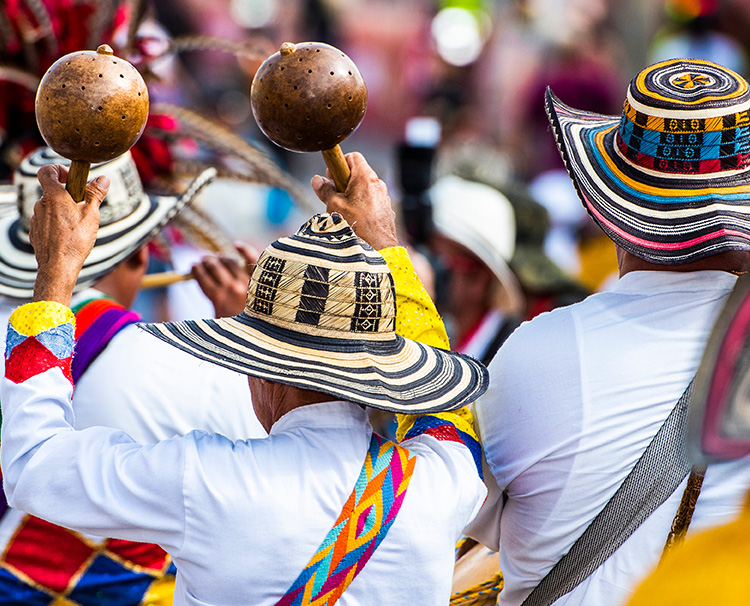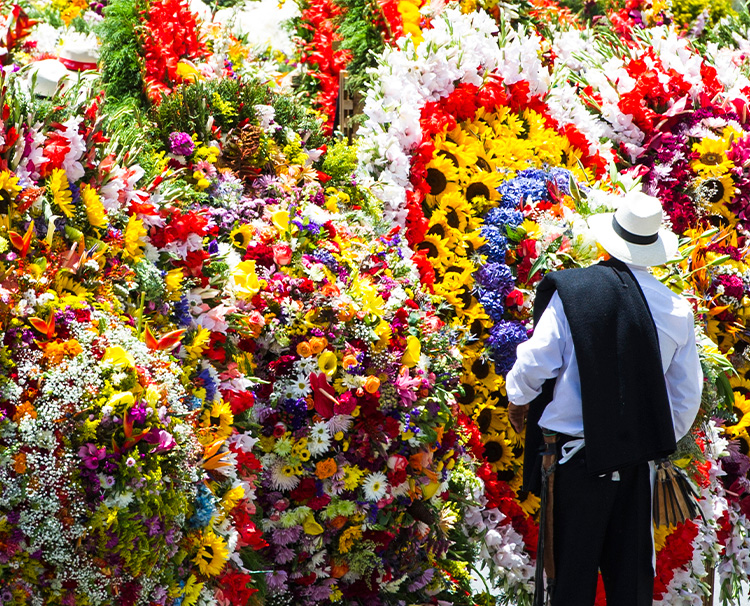Festivals and holidays are central to Colombian culture, and there is no doubt that Colombia can throw a celebration like no other. From honoring cultural heritage and music to celebrating religion and flowers, you can find an abundance of festivities throughout Colombia every month of the year. Over 80 festivals take place annually, and they are not to be missed! Join us on the Magdalena River and learn more about Colombian celebrations!
Carnaval de Barranquilla
(typically occurs in late February - early March)
Barranquilla boasts the second largest Carnaval celebration in the world. In 2003, UNESCO declared the Barranquilla Carnaval a “Masterpiece of Humanity’s Intangible and Oral Heritage.” Four days before Lent, the city breaks out into boisterous festivities. Carnaval Barranquilla begins with the six-hour La Batalla de Flores (The Battle of the Flowers), which dates back to 1903 when the people of Colombia celebrated the end of the One Thousand Days War by fighting with flowers in place of bullets. During the parade, the Carnaval Queen oversees folk dancers, fire breathers, and musicians. The next two days are filled with dance competitions and parades. The fourth and final day features the burial of the mythical Joselito. This is marked by two parades: one mourning the figure’s death, and one representing the joy of celebrations.
Every year, attendees shout the festival’s joyful motto into the streets: “Quien lo vive es quien lo goza,” which translates to “He who lives it, enjoys it.” To truly understand Carnaval, one must immerse themselves in the celebrations. Over the four days, the streets of Barranquilla become overrun with music, masks, costumes, floats, and an explosion of colors. If you miss the Carnaval season, don’t fret! While sailing on our Magdalena River cruises, you can experience a dynamic Carnaval performance in Barranquilla – exclusive to AmaWaterways guests!

Palenque’s Celebration of Tambores
(typically occurs early to mid-October)
Eagerly anticipated by the 4,000 townspeople of Palenque, the Festival de Tambores y Expresions Culturales de Palenque brings the community together for three days of vibrant music, graceful dance, and delicious cultural delicacies. Drums echo throughout the streets as artists display their celebratory work for all to marvel at. This special annual event showcases the heritage of the first free town in the Americas, proclaimed by a royal decree from the Spanish crown in 1961. Our Colombia itineraries showcase the spirit and music of this town on every visit, and those visiting Palenque during this time can witness the unique charm and fascinating history this special festival provides.
Mompox Jazz Festival
(typically occurs during October)
Many from across the globe venture to Mompox to celebrate its unique culture and heritage, and during this festival, everyone’s attention is centered on the music. During this international jazz festival, visitors can immerse themselves in a variety of music styles, from merengue and bachata to porro and other genre varieties from the other side of the Atlantic Ocean. Not only can festival goers expect an incredible line up of performances, they can also look forward to a plethora of educational workshops throughout the town with a focus on empowering young musicians. From bars to churches, the magic of Mompox’s music festival is showcased around every corner of the beautiful town. The closing concert in the Plaza de Santa Barbara is one of the most exciting parties one can experience in this incredible town.

Feria de Las Flores
(typically occurs in late July – early August)
Medellín’s Feria de las Flores (Flower Festival) is renowned for its spectacular floral displays and lively festivities. Set in the “City of Eternal Spring,” the festival takes place over the course of a week. The main attraction in the Desfile de Silleteros, the silleteros parade. Silleteros are the porters who used to carry colonial officials on a chair on their backs. During the event, local flower growers march through the city with massive, elaborate flower displays strapped to their backs, known as silletas. Every year, men and women parade through Medellín, proudly displaying floral depictions of their histories, land, and culture. Visit this captivating city on our pre-cruise land packages.
The Sounds and Rhythms of Cumbia
Vibrant colors, exciting drumming, and lively folk dancing are all central to Colombia’s proud heritage. Cumbia music and dance is at the heart of Colombian culture. Originating centuries ago on Colombia’s Caribbean coast, cumbia is a unique mix of Spanish, African, and indigenous tradition. It is characterized by rhythmic beats and colorful Latin-inspired costumes and instruments. Women traditionally wear long, colorful skirts and flowered headdresses. Men wear white shirts and pants, accessorized by red bandannas and a sombrero. Performers dance to the sounds of guitars, drums, and maracas. Cumbia music and dance features heavily in celebrations across the country and there are several festivals that center around the art form, including the annual Festival Nacional de la Cumbia (typically occuring in mid-August) in El Banco, Magdelena. Experience a special shoreside dinner and exclusive cumbia performance during every AmaWaterways journey along this majestic river!
A Colombian Christmas
In addition to a wide spread of festivals, Colombians have unique traditions for many holidays, including Christmas! Colombians begin their Christmas celebrations December 7th with the Día de Las Velitas (Day of the Little Candles). On this night, people line their windowsills, porches, sidewalks and streets with candles and paper lanterns. Towns and cities glow with candlelight in celebration of Mary’s immaculate conception.
In Colombia, Christmas is nothing without a bounty of food. Natilla is one of the country's most beloved holiday dishes. The milk-based, pudding-like snack is usually enjoyed alongside other festive foods such as buńuelos (mouthwatering fried dough balls – served piping hot). These delicious treats are most often enjoyed during the novenas, the nine nights leading up to Christmas when families gather to recite traditional prayers, eat, drink, and be merry. On Christmas Eve, baby Jesus is the one to deliver presents to the children rather than Santa Claus or Saint Nicholas! Enjoy Colombia's unique Christmas traditions during special holiday 2025 departures:
Join us for a taste of Colombia and its festival and holiday seasons. Contact your preferred travel advisor to learn more about our itineraries on the Magdalena River!